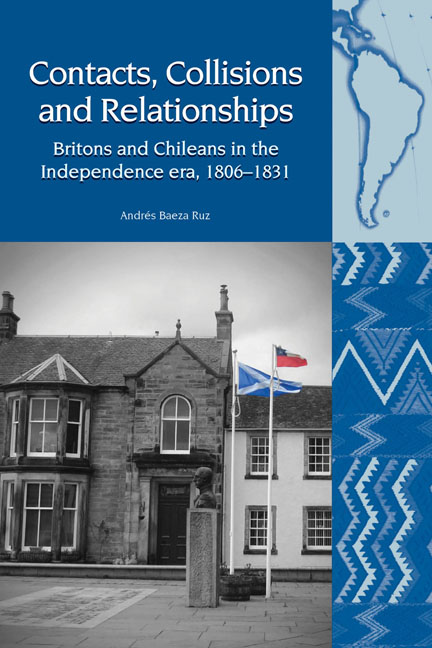Book contents
- Frontmatter
- Contents
- Acknowledgements
- Abbreviations
- Preface
- Introduction
- 1 Invasions, Negotiations and Conspiracies: British-Chilean Relations in an Era of Change, 1806–1817
- 2 Cultural Encounters Offshore: Britons and Chileans in the Chilean Navy, 1817–1823
- 3 Bibles, Schools and Citizens: British Protestant Missionaries and Educators in Chile, 1817–1831
- 4 British Merchants, Private Interests and the Fostering of Free Trade in Chile, 1811–1831
- 5 Beyond Diplomacy: The Cultural Significance of British Recognition of Chile's Independence, 1817–1831
- Conclusion
- Bibliography
- Index
1 - Invasions, Negotiations and Conspiracies: British-Chilean Relations in an Era of Change, 1806–1817
- Frontmatter
- Contents
- Acknowledgements
- Abbreviations
- Preface
- Introduction
- 1 Invasions, Negotiations and Conspiracies: British-Chilean Relations in an Era of Change, 1806–1817
- 2 Cultural Encounters Offshore: Britons and Chileans in the Chilean Navy, 1817–1823
- 3 Bibles, Schools and Citizens: British Protestant Missionaries and Educators in Chile, 1817–1831
- 4 British Merchants, Private Interests and the Fostering of Free Trade in Chile, 1811–1831
- 5 Beyond Diplomacy: The Cultural Significance of British Recognition of Chile's Independence, 1817–1831
- Conclusion
- Bibliography
- Index
Summary
Introduction
Relations between Britain and Chile began in the sixteenth century when, according to several testimonies, smugglers, privateers and scientific travellers from Britain and Ireland frequently met and interacted with Chileans. The period in which Chile and the rest of the Spanish colonies in America fought to establish themselves as new political entities represented a new stage in this relationship. This chapter analyses the relations between Great Britain and Chile between 1806 and 1817. In this period, Chile was not yet an independent state, but still a Spanish colony. The inhabitants of Chile, for their part, were still subjects of King Ferdinand VII and behaved as such. Between 1806 and 1817, ideas about Chile's place in the world were discussed and debated, resulting in a revolutionary movement that ultimately achieved independence from colonial rule. As subjects of the king of Spain, Chileans shaped their first attitudes and reactions towards Britain during these years. Their views of Britain and Britons were determined by the British invasions of Buenos Aires – the capital of the Viceroyalty located on the other side of the Andes, next to the General Captaincy of Chile – that took place in June 1806.
These invasions had almost immediate consequences for both Britain and Chile. Firstly, the initial success of the invasions led the British authorities to outline a plan to invade Chile in order to consolidate a trade route to connect the Atlantic and the Pacific. There had been British proposals to invade Chile before, but in 1806 the British state was directly involved in the very design and delivering of such a plan. This is clear evidence – overlooked by the existing historiography both in Britain and Chile – that British policy regarding Chile went through an explicit, if brief, ‘imperialist’ phase. This was not simply an ‘economic influence’, as suggested by Antony McFarlane, but an outright plan to transform Chile into a British colony. The plan itself – discussed in detail in this chapter – clearly states that the British forces must occupy Chile, and that the British monarch must rule the local population.
- Type
- Chapter
- Information
- Contacts, Collisions and RelationshipsBritons and Chileans in the Independence era, 1806-1831, pp. 26 - 66Publisher: Liverpool University PressPrint publication year: 2019



